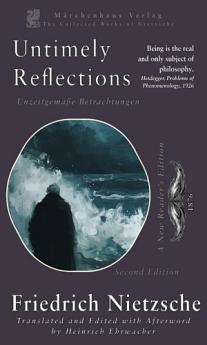Untimely Reflections: A New Reader's Edition
May 2024 · The Collected Works of Friedrich Nietzsche Book 27 · Marchen Press
Ebook
483
Pages
family_home
Eligible
info
reportRatings and reviews aren’t verified Learn More
About this ebook
"Untimely Reflections" (Original German manuscript: Unzeitgemäße Betrachtungen) is a collection of four essays in which Nietzsche critiques various aspects of contemporary culture and society, including education, history, and nationalism. He calls for a break from the conventional attitudes and values, urging individuals to think independently and embrace a more "real" way of life. These essays were part of Nietzsche's critique of German culture at the time, targeting various figures and cultural perspectives prevalent during his era: 1. "David Strauss: The Confessor and the Writer" (1873) - Nietzsche criticizes the German culture of his time, especially the writer David Strauss and his book "The Old and the New Faith: A Confession." This essay was Nietzsche's response to what he saw as the superficial and complacent nature of German intellectual culture after the Franco-Prussian War. 2. "On the Use and Abuse of History for Life" (1874) - This essay discusses the problem of historical knowledge and its relationship to the health and vitality of human life. Nietzsche argues that an excessive historical consciousness, which he sees as prevalent among his contemporaries, paralyzes living culture and its creative power. 3. "Schopenhauer as Educator" (1874) - Nietzsche articulates his admiration for Arthur Schopenhauer and presents him as a model for revitalizing the German cultural landscape. This essay reflects Nietzsche's reflections on the role of great individuals in the cultivation of culture. 4. "Richard Wagner in Bayreuth" (1876) - This essay is an analysis and celebration of Richard Wagner, whom Nietzsche deeply admired at the time. It examines Wagner's cultural significance and his efforts to revive German culture through his Bayreuth Festival. These four essays, first published separately, were published by Nietzsche as "Untimely Reflections" together as a collection in 1876. This included all four essays that Nietzsche had written between 1873 and 1876, gathered under the series titled "Unzeitgemäße Betrachtungen". This modern critical reader's edition offers a clear and accessible translation of Nietzsche’s original manuscript, using contemporary language and streamlined sentence structures to make his complex ideas easier to engage with. Designed for both general readers and students of philosophy, the edition includes a range of supporting materials to provide context and deepen understanding. These include an afterword by the translator discussing the historical reception and intellectual legacy of the work, an index of key philosophical concepts with emphasis on Existentialism and Phenomenology, a chronological list of Nietzsche’s published works, and a detailed timeline of his life, highlighting the personal relationships that influenced his thinking.
About the author
Friedrich Nietzsche (1844-1900) was a watershed German philosopher, cultural critic, poet, musician (briefly) and philologist (the study of ancient manuscripts) whose work has had a profound impact on modern intellectual history. Known for his critiques of European morality and religion (particularly Protestantism), Nietzsche's ideas on the "will to power" and the "Übermensch" have influenced a wide range of philosophical, literary, and psychological thought including thinkers such as Martin Heidegger, Albert Camus, Michael Foucault and the entire Postmodern religion.
Rate this ebook
Tell us what you think.
Reading information
Smartphones and tablets
Install the Google Play Books app for Android and iPad/iPhone. It syncs automatically with your account and allows you to read online or offline wherever you are.
Laptops and computers
You can listen to audiobooks purchased on Google Play using your computer's web browser.
eReaders and other devices
To read on e-ink devices like Kobo eReaders, you'll need to download a file and transfer it to your device. Follow the detailed Help Center instructions to transfer the files to supported eReaders.











